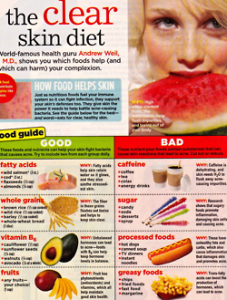Acne can be a bothersome skin condition that is not only a source of embarrassment to adolescents but it can plague adults as well. A lot of foods have been associated with the annoying “zits” from chocolates to French fries or junk food. More research has come up in recent years, and some new facts have emerged. Clement Adebamowo of the Harvard School of Public Health in Boston studied 4,000 teenage boys and found a significant association between the intake of skim milk and the development of acne. There are numerous explanations for the dairy-acne connection. According to US doctors Alan Logan and Valori Treloar there are at least 4 precursors of the “acne hormone” dehydroepiandrosterone in milk from pregnant cows. Even though milk has a low glycemic index research has substantiated that milk based foods increase levels of insulin. Insulin in turn seems to be one of the major players when it comes to skin fat production (sebum). This leads to the blockage of skin follicles and the development of blackheads and acne. Lacks of dietary oxidants are also putting fuel on the fire of acne. Acne sufferers demonstrate lower antioxidant blood levels and as a result there is no ammunition to fight the skin inflammation of acne. Other foods contributing to this problem are omega-6 rich oils (sunflower, safflower and soybean).
Strong allies to fight the inflammatory process of acne are foods that are rich in omega-3 fatty acids such as salmon, mackerel or sardines. The intake of fruit and vegetables is beneficial (acne sufferers generally eat fewer fruits and vegetables than those who have a clear skin.) A trial by Robyn Smith of RMIT University in Melbourne, Australia showed that acne patients who were instructed to consume a low glycemic diet high in protein had significantly less acne lesions that their counterparts. This dietary approach reduces androgen levels. Beside a dietary approach there is still the need for dermatological input. Using both avenues acne sufferers will reap the most benefits.
More information about acne vulgaris: http://nethealthbook.com/dermatology-skin-disease/acne-vulgaris/
The Medical Post, June 24, 2008, page 19
Last edited November 4, 2014






